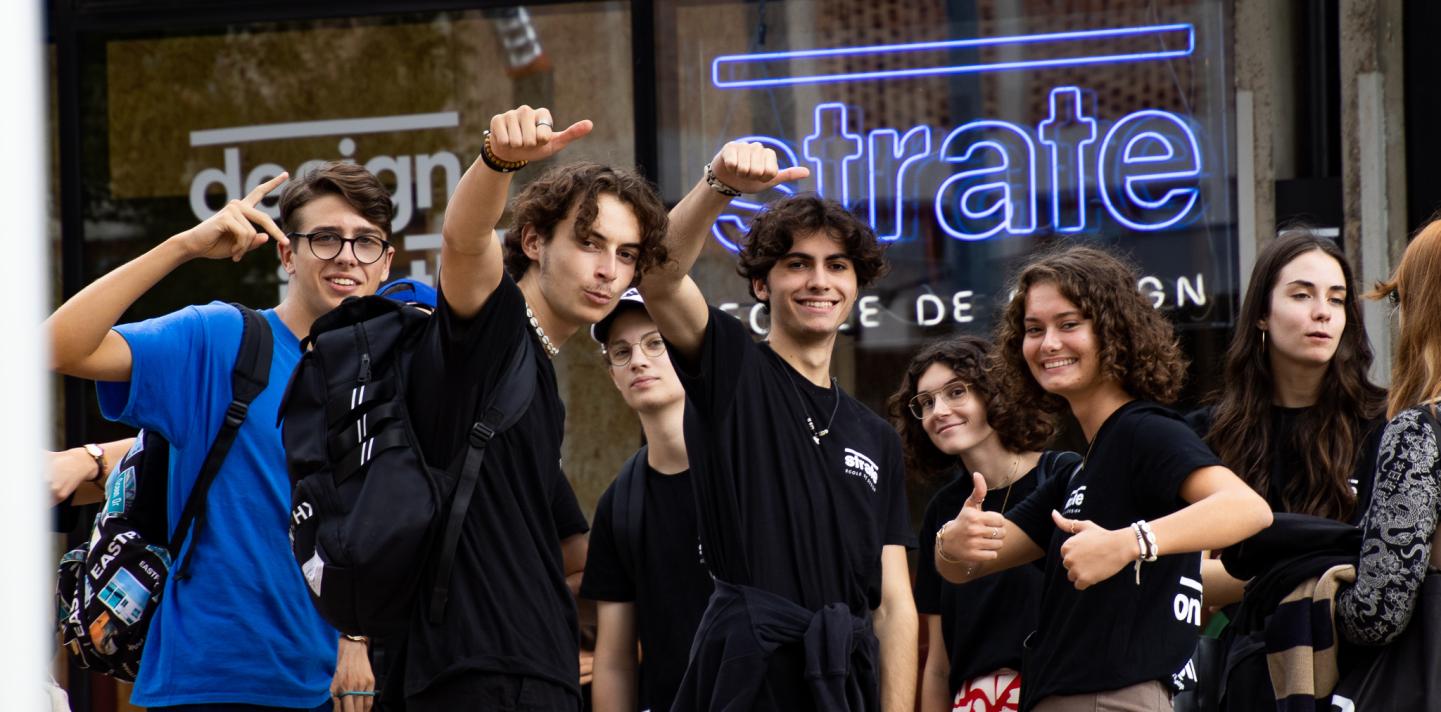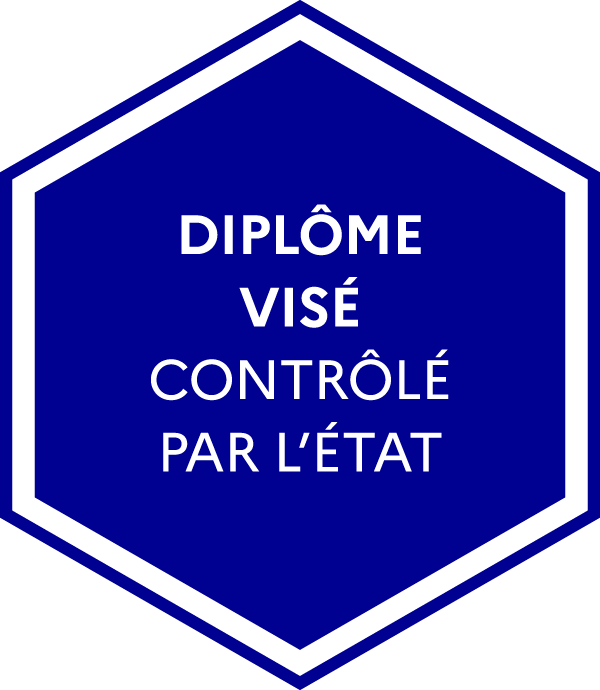

Industrial Design Training
For more than 30 years, Strate has been training the people who think, create, test, produce and promote the objects, systems and services of tomorrow.
Making the world + simple + fair + beautiful
Designer first and foremost!
Because they work on life scenarios where many issues are intertwined, designers apply cross-disciplinary knowledge, methodologies and techniques. Of course, he or she is also the bearer of specific knowledge, practices and techniques.
The Industrial Design Cursus is a 5-year program designed to offer these cross-disciplinary and specific skills

Le diplôme de Designer industriel est visé (Bac+5 - Niveau 7) par le Ministère chargé de l'Enseignement Supérieur et de la Recherche [et est enregistré au RNCP sous le numéro 38670].
Titre de Designer Industriel de Strate Ecole de Design Paris et Lyon - niveau 7, enregistré au RNCP sous le numéro 38670 par décision du Directeur Général de France Compétences du 16 février 2023.
The 5-year Industrial Design Cursus
New for the start of the 2025 academic year: the Industrial Design cursus opens up internationally with the opening of a class taught 100% in English from the 1st year.
2 years of core training
The first 2 years are dedicated to fundamental teaching and the development of initial design projects.
The 1st year is dedicated to the acquisition of representation techniques, the designer's tools and the discovery of the design project. Artistic techniques (sketching, volume, color, perspective, typography, etc.) are worked on intensively, because the ability to represent is at the heart of the designer's expertise.
List of courses :
- Representation techniques (perspective, live models, sketching, graphics, sculpture, etc.)
- Cultures (art culture, design culture, biomechanics/materials, photography, etc.)
- Digital tools (introduction to DTP)
- English
- Communication
- Methodologies (creative posture, project management, etc.)
- Design discovery (1 major project per semester)
- SHS and writing (observation, description, analysis)
- Professionalization
Annual teaching hours: 626 hours.
The 2nd year extends and deepens the knowledge acquired in the 1st year. While drawing, volume and 2D software are still part of the curriculum, students begin to focus on their chosen course of study, concentrating on projects. This is also the year to experiment with materials and start prototyping. The program is rounded out by community involvement.
List of courses :
- Representation techniques (sketching, storyboarding, cartography, etc.)
- Experimental graphic design (semiotics, history of graphic design, experimental design)
- Cultures (art culture, poetics of things, design culture, history of technological design, biomechanics, etc.)
- English
- Digital tools (DTP, CAD)
- Formalization and prototyping (mock-ups, paper prototyping, biomaterials, materials & processes)
- Methodologies (inquiry methods, affordance and manipulation)
- Introduction to the 5 design streams (5 projects)
- Design and naturalistic immersion
- SHS and writing (aesthetics and design theory)
- Professionalization
Annual teaching hours: 568 hours.
The 3rd year is always supervised by design professionals, and students are confronted with real-life problems that they have to solve in all their dimensions: conceptual, formal, social and technical. The 3rd year is also the year of the first major internship. For 4 to 6 months, each student is immersed in a sector of activity related to his or her specialization (integrated design, agency, start-up).
Annual teaching hours: 479 hours.
Supervised by design professionals, 4th year students are confronted with real-life problems, which they must solve in all their dimensions: conceptual, formal, social and technical.
The year is built around industrial partnerships with companies and their design, marketing or R&D departments. These companies offer students the opportunity to carry out complete prospective design studies.
This is also the year during which students take part in a semester-long exchange program abroad, choosing from among 3 options:
- internship abroad,
- academic exchange,
- study trip.
Annual teaching hours: 422 hours.
The 5th year begins with an analysis phase and continues with a design phase, during which students implement the various stages of their diploma project, which they will present at their final defense before a jury of professionals.
At the same time, the student continues to work closely with the professional world, responding to the concrete problems of our partner companies through projects and a final internship lasting 4 to 6 months.
Annual teaching hours: 110 hours.
Training objectives
The educational objectives of the Industrial Design program are to enable learners to:
- Acquire and master expertise in the main fields of action of transport & mobility design in the face of current and future challenges, thanks to a multidisciplinary team and tailored training and programs,
- Apply a project-based approach thanks to a modular curriculum and flexible teaching methods tailored to real-life issues, including a significant proportion of courses in English,
- Integrate the humanities, social sciences and life sciences, taking a critical look at design to diagnose contemporary dysfunctions,
- Draw on research: benefit from the expertise of a team of researchers to integrate the latest advances in design into the curriculum,
- Adopt an ethical dimension to design, and become aware of the social and environmental responsibilities incumbent on future designers,
- Collaborate with a dynamic ecosystem and interact with a network of partners and companies to orient and enrich training in line with current design requirements.
The aim of the Design program is to train creative, multi-skilled professionals capable of devising innovative solutions in various fields of design. Upon completion, students will be able to:
- Implement advanced and specialized uses of digital tools
- Produce and mobilize highly specialized knowledge
- Implement specialized communication for knowledge transfer
- Contribute to transformation in a professional context
- Launch an industrial design project
- Identify and prototype creative solutions
- Design a product based on functional and technical choices
- Manage an industrial design project through to the rendering phase
- Face-to-face courses led by professional lecturers who are experts in their field,
- Simulated and real-life work placements, involving group and/or individual work on real-life orders submitted by partner organizations (companies, associations, local authorities, etc.),
- Individual coaching throughout the course, and particularly in the final year when students specialize and work on their diploma project,
- Empowerment through group work and collaboration, even on individual projects.
- Lectures by specialist speakers on subjects related to the curriculum.
The assessment procedures for the design curriculum are as follows:
- Continuous assessment
- Individual and group project-based assessments: reports and presentations
- Several work placements based on real or fictitious business cases
- Thesis presentation
- Individual end-of-study project, demonstrating the ability to implement a methodological process: investigation, testing, creative iteration, formalization and presentation of the project.
- Internships
Training key figures
3.8/5
95%
5/5
*"I find that Strate is a school that allows you to fully develop your creativity and technique through projects supervised by quality teachers and lecturers. As a 2nd year student, I love being able to use the workshops and all the tools at our disposal to shape my ideas and projects.”
Camille L.
Further studies
This program, which grants a level 7 certification, prepares you to enter the workforce at the Bac+5 level. However, if you wish to continue your studies for specialization and attain a higher level of responsibility, you can pursue a doctorate.
Career opportunities
- Industrial Designer
- Product Designer
- UX/UI Designer
- Packaging Designer
- Interaction Designer
- Brand Designer
- Graphic Designer
- Art Director
- Service Designer
- Design Strategist
- Innovation Consultant
- Exhibition Designer
- Retail & Interior Designer
- Scenographer
- Sustainable Designer
- Design Researcher
Diploma
Designer diploma approved and recognised by the Ministry of Higher Education and Research.
Diploma in Industrial Design from Strate School of Design, level 7, registered with the RNCP under number 38670 by decision of the Director General of France Compétences on February 16, 2023.
95% of students obtained their diploma - Class of 2022-2023 (Paris Campus)
The course does not allow partial validation of one or more blocks.
Each block of skills can be capitalized. Validation of all blocks leads to certification.
To obtain certification, all identified skill blocks must be validated.
No equivalences.
There are no gateways for this diploma.
Application and registration
To join Strate’s Industrial Design program right after high school, you need to:
- Hold a high school diploma (or equivalent)
- Provide a motivation letter and a creative portfolio
- Complete a 45-minute individual interview
- Be fluent in English (minimum B2 level)
Cost of training
- 1st year: 10 400€
- 2nd year: 10 990€
- 3rd year: 10 990€
- 4th year: 11 190€
- 5th year: 11 190€
Application fee¹: 590€¹
Association fee² : 40€²
Alumni association membership³ : 30€
Rates applicable for 2025-2026, subject to annual revision.
¹ Only the year of registration
² Mandatory annual subscription for Strate associations
³ Compulsory annual subscription for Strate alumni association
You'll find all the information you need about financing and housing here
Informations pratiques
Admissions Paris : Contacter
Vous êtes en situation de handicap ? Vous avez une RQTH ? Vous avez des difficultés spécifiques ?
Strate vous accompagne pour votre réussite, quelle que soit votre situation.
Un entretien individuel vous sera proposé afin de déterminer avec vous l’adaptation nécessaire pour votre parcours de formation.
- Votre contact à Strate Paris : Angélique Vente